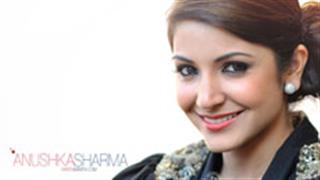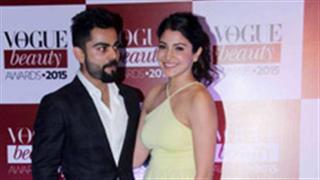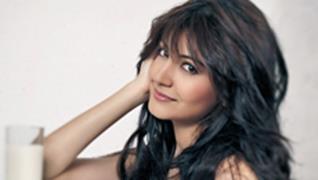In Ae Dil Hai Mushkil, why would the heroine (Alizeh) not fall for Ranbir Kapoor's character (Ayan): he's smart, good-looking, funny, charming, and they get along like crazy. What could be wrong with him? Is it that the first time they met and made out, there was no sexual chemistry?
Anushka: That was definitely one of the reasons, which is why that scene is there in the first place. Basically, when she called him over to hook up at the party, she didn't think it was going to turn out this badly, and she'd instantly friend-zone him. Also, in life, it's a superficial way of looking at things - that he's good-looking, charming etc., and why would you not fall for him?
So it was about the snog-fail...
Anushka: Initially, yes. But sometimes, you just don't feel that way about someone. Yet you realise there's so much more to two people than a possible hook-up - which would get over, and they would move on anyway. They actually end up talking, figure they're both film buffs, their lives are similar, and they have great chemistry otherwise. She certainly loves him, but there are several layers to those feelings, and that's what's novel (about what the film explores).
Usually (in films), it's either 'dost hai' (they're friends) ya 'pyar hai' (or they're lovers). Ya phir dost se pyar ho jaata hai, ya phir pyar se dosti ho jaati hai (Or they become lovers after being friends, or vice versa). I really worked on this headspace of Alizeh, trying to understand her completely. You can't just play a role such as this by learning your dialogue... The feelings are very complex. It can also get toxic when two people are friends, but one of them harbours other feelings.
I think boys tend to take this bit about friend-zoning far more seriously. But yes, it does get difficult and toxic for the girl too. But as soon as Ayan expresses his feelings for Alizeh, they stop talking to each other, right? It is for this reason, I had asked Karan to include a point in the film where Alizeh makes it known to Ayan that if being in this kind of relationship is difficult for you, then let's not (carry on any further), because it is not difficult for me. I have somewhere in my life experienced this - being aware of someone's feelings for me, while being in no position to reciprocate. You have to take responsibility so as not to lead them on.
And she was also in a relationship...
Anushka: I remember when Fawad was cast, we all felt relieved because the other person (in the film) just had to be as strong, and it is a cameo, with little space for Fawad's character (Ali) to reveal his feelings for Alizeh. He had to convey a lot more, merely through expressions.

Fawad was there in the film as your co-star, but everybody just abandoned him during the film's release, given the controversy. I can understand Karan Johar's predicament as a producer, but what about the cast, and his Bollywood 'friends'? Did you not speak to him, or did you lose touch?
Anushka: I'd never been in touch with Fawad to begin with. We only interacted on the set, and that's about it. So there was nothing new about it, in that sense, after the incident took place.
Did you feel terrible about the situation, though?
Anushka: We didn't feel it would turn out the way it did. Everybody had worked hard for months on the movie, when things were very different, and now we couldn't have been held responsible for a changed (Indo-Pak) situation. But things between India and Pakistan have always been iffy, so this self-censorship on the part of filmmakers to not work with Indian artistes was weird in its own way, no? I wouldn't want to comment on the issue, because it can get misconstrued.
And it's a much larger issue than a film. All I know is that I come from an Army background. My father was in the infantry, I've sat next to my mother and seen her glued to the TV screen during the Kargil War, when my father would call us once in three months, and we didn't know where he was. I've seen it that close, so I can understand how people must've felt. But the issue itself is beyond two people's conversation on it.
How gorgeous is Aishwarya Rai, 43, in the Ae Dil...? There's a scene in which you make fun of what you're looking like, next to her. Was that a self-conscious/deliberate take?
Anushka: I am that girl in real life. I'm not some stunner. And that's what Alizeh is - she can make a joke about such things, because she doesn't take herself seriously. There's an awkwardness, when you meet somebody (like Ash). It becomes an elephant in the room that you need to address, by making light of the situation!
Going by box-office figures, around R420 crore is what your two movies have grossed this year, which makes you the No. 1 female star, But your biggest achievement is starring in a Salman film, Sultan, and actually bagging a proper female part that you even had to prep for! How did that work out?
Anushka: Adi (Aditya Chopra) has always known that my choices are made on the basis of what contribution I'll get to make. And I'll only have it that way, in order to derive any satisfaction. So when Sultan was first offered to me, I was like, what would I be doing in this film? But I knew if Adi is offering it to me, so there must be something, and I was convinced of the potential of the role. It's not about the length of the role, but what the presence of the character does to the film's story.
Surely, you've had your own, unique career trajectory. But you spoke about your dad earlier, who is an Army man. It surprises me the number of female actors in Bollywood, who're from the Services background - Sushmita Sen, Priyanka Chopra, Aishwarya Rai, Preity Zinta, Neha Dhupia, Gul Panag... What's the connection?
Anushka: Well, those who come from an Army background, especially girls, aren't brought up along the same standards as, perhaps, a others in the same society. Unless the parents are really misogynistic, the boys and girls grow up with a complete equality. My brother and I had the exact same upbringing. He was asked to be as careful as I was, because we also got raised in a very protected environment - our school, hospital, everything was right there. There is also uniformity in living. All the houses look the same. What happens in such a space where one doesn't look at differences in social-status, or money, is your character and personality ends up developing in a different way. Not just in the film industry, you'll see a lot of Army kids successful in other spheres. We're encouraged to ask questions and express our opinions at parties, with generals, and high-ranking officials. There's a sense of freedom that you carry in your head. This makes being able to approach professions such as the film industry with a lot more confidence.

So you're saying the cantonment allows you to be unconscious of whether you're a girl, boy, rich or poor?
Anushka: It's only when I came to the 'civilian' world, starting out as a model (at the age of 14), that I first wondered: Why are people so petty? We have more real issues to deal with. Our fathers are posted in the border. It's a different life altogether. Who I am as a person has a lot do with my upbringing. You need self-assuredness to enter an industry like ours. That's how you see someone like Priyanka (Chopra), a confident girl, ruling the world right now. I'm so proud of her. It's hard what she's doing right now.
Also, we keep moving homes and cities so often, always making new friends. This helps you adapt more easily. That's why, maybe, today I don't get shaken up so easily with life changing scenarios.
Did you always know you were going to land up in Bollywood?
Anushka: If you'd told me about 15 years ago that this is where I was going to be, I'd say you were crazy. Being an actress is such a far-fetched thing for where I come from. Growing up, I must've seen probably five movies a year in the theatre!
But you've said before that you always knew you were going to be famous...
Anushka: Bizarre as it may sound, I knew that I was going to be famous. I was deeply ambitious, and I wanted to be 'somebody'. I would give interviews to myself in the bathroom mirror, asking questions to myself, and answering them! If I saw a tennis match, then I was a tennis star; I was an author once... I'd pick up roles and give interviews! Maybe that's why I became an actor (laughs).
You never stood before the mirror and practiced lines, or dance steps?
Anushka: Even now I can't stand before a mirror and act. Even if I'm dressed up, or waking up in the morning, I am not looking at myself. I guess if you always know that you're going to be an actor, you become ready for speculations, people's interest in your life, and public scrutiny that comes with the job. I don't think that I was prepared for that one bit, when it happened. I still don't know how to react to compliments, autograph seekers... It's very complex. I just wanted to be someone with a certain standing (in society).
This concerns the beginning of your career, and of course Aditya Chopra, who you auditioned for, and got the big break, with Rab De Banade Jodi, that released in 2008. Does Aditya Chopra really exist?
Anushka: (Laughs) I didn't even know he was a mystery, when I first met him. When I told my brother I was going to meet this guy, Aditya Chopra, he was like, `Are you crazy? Do you know who you're going to meet, the director of Dilwale Dulhaniya Le Jayange!` This sense (of anticipation) only made me nervous. But he was very warm and normal, not intimidating at all. Even as a businessman, there is a certain fairness and integrity he brings to his company. As a mentor, he's always given me the freedom to choose the film I want to, and say no when I want to. And I have said no to him. He's never taken it to heart, only encouraged me to be this way.

What sort of filmmaker doesn't show up for his own film's trailer launch (Befikre in Paris)?
Anushka: I guess he sees himself as a filmmaker, or director. His job is to make films. I understand his point of view completely. If I wasn't an actor, I would have been like Aditya Chopra.
Yuvraj Singh just got married to actor Hazel Keech, only adding to the whole string of moviestar-cricketer combo through history, right from Tiger-Sharmila, Azhar-Sangeeta, Harbhajan-Geeta Basra... What's the connection between cricket and movies? They seem pretty disconnected to me (Anushka is dating Virat Kohli).
Anushka: Let's look at it this way: Who are the actors getting married to otherwise? To other actors, directors, producers... So you are getting married in the circle you are in, because those are the people you get to meet, unlike say, a doctor or banker. That's the only logical explanation.
But what's cricket got to do with movies? Is it the fact that both produce the real stars in terms of popularity in this country?
Anushka: They are the most popular professions in the country, yes. And an actor meeting a cricketer is more likely, and possible - like at an event, or party. The two professions are kind of interlinked in a way.




















